First-hand reflections on The Alters
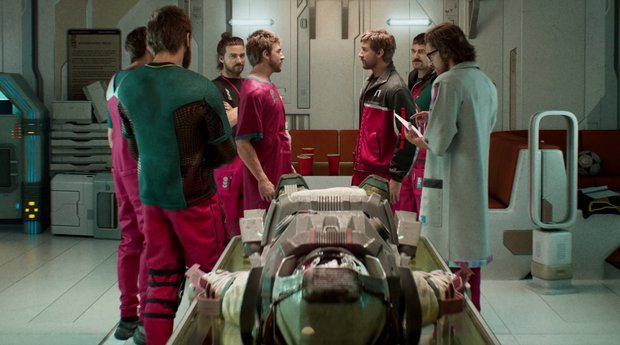
- 2 Comments
I would love to play The Alters: The Adventure Game. The thought of navigating the many life-threatening perils on another world, accompanied only by newly awakened alternate versions of the lead character, each with their own backgrounds, personalities, abilities and interests, is a concept that’s simply oozing with dramatic potential. It’s ripe for, at the very least, a Telltale-style narrative adventure where choices have consequences and relationships impact the success of your mission and perhaps even decide your very survival.
Sadly, The Alters is not that game – or at least, is only partly that game. It has the same premise, and does indeed have many choice-driven interpersonal conflicts between its lead characters (character?), but it’s very much a strategy/survival/base building/resource management experience in between. Yes, my first clue should have been its developer, as 11 bit studios are renowned for their similarly narrative-heavy yet survival-focused Frostpunk series and This War of Mine. And it’s not like they hid the fact that The Alters would play out along similar lines. But the whole “dealing with various versions of yourself” theme has always been the key marketing hook, and 11 bit as a publisher has produced other recent adventure games such as The Invincible, INDIKA, and Creatures of Ava, so I’d hoped that this game would concentrate more on the social drama than the minutiae involved in the ongoing act of survival.
Nope.
Clearly my hopes were overly optimistic, as juggling the many aspects involved in staying alive, keeping my extraterrestrial mobile mining station operating, and babysitting my alternate selves as necessary to keep them all actively productive has accounted for huge chunks of my many hours with the game so far. I’ve moved to new locations a couple of times and spawned several different alters, but there’s still no sign of reaching the end. Or not a positive end, anyway. I have managed to burn all of us to a crisp in the rays of a deadly sun that’s ever encroaching to keep the pressure on, but I can’t imagine that’s the ideal intended outcome.
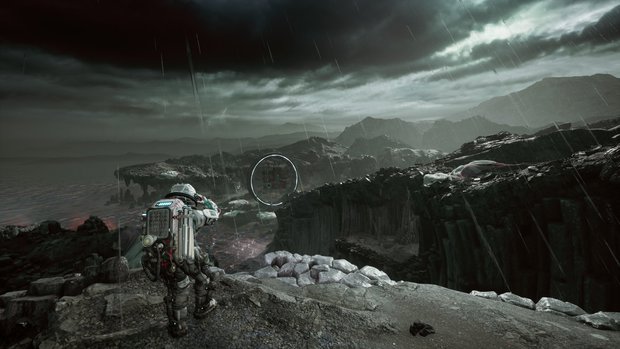
Of course, fans of this kind of game may well be delighted that this is the case. By all accounts The Alters is generating lots of good buzz from adding a clever new storytelling wrinkle to a familiar formula. I suspect, however, that for those like myself who are coming from the opposite direction, the result is more likely to be one of disappointment. There’s certainly some intrigue to be found in dealing with your pseudo-clones, but the narrative element isn’t deep enough to carry the game on its own, leaving a huge reliance on the other gameplay elements to keep things moving along. I don’t consider myself experienced enough with management and survival games to fairly judge the merits of this one, so this isn’t a formal review per se. Still, it’s worth a look at the nuts and bolts for those who are equally interested in its potential.
The game stars Jan Dolski. And Jan Dolski. And another Jan, and another Jan.... At first, however, there’s only one (presumably the original). There’s almost no Jans after a crash landing leaves him the sole survivor of a crew sent to harvest a special substance called Rapidium on an alien planet. It’s a stunning world, as gorgeous as it is bleak, all striking jagged rock formations, inky black waters and ominous dark skies. There’s no time to gawk, however, as a lethal radiation storm is about to hit, forcing you to high-tail it to your giant rolling station in time.
You make it, barely, but that’s just the start of your troubles. The station needs refueling and you’ll have to eat, manufacture equipment, and mine for resources in between getting sufficient rest, all in the handful of days it’ll take for the sun to reach your position. Oh, and the garbled, enigmatic communications from your employer, Ally Corp, strongly encourage you to find some Rapidium while you’re at it. They have their bottom line to think about, after all, and it becomes clear very quickly that you’re more expendable than you want to believe.
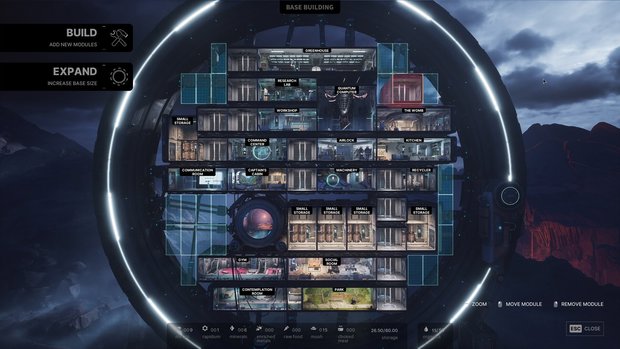
Gameplay is split between exploring the planet for resources in traditional over-the-shoulder, free-roaming 3D, and maintaining the station, displayed as a cross-section diorama like a huge round dollhouse that’s navigated in a more conventional adventure game style. There’s a LOT to juggle – at least, if you’re not used to this sort of game – and The Alters does a terrible job of easing the learning curve. Scattered popup tutorial boxes offer a bit of guidance, but they’re too bare-boned to be of much help, and they don’t come close to covering everything you need to know. There are many on-screen symbols never introduced, let alone explained, and while your current objective is always visible, figuring out how everything works involves poring over the extensive database information in multiple menu tabs (and sub-tabs) as you go along. It’s not hard so much as it is a slog that feels more like homework than fun.
After some trial and error and a frustrated restart I began grasping the basics, but original Jan is a builder and it seems players are expected to come equipped with the same knowledge. To harvest anything but shallow deposits on the planet’s surface, you’ll need to build equipment like a climbing hook, a scanner and transmission pylons to link back to the base; to build equipment you’ll first need to build a workshop; to build a workshop and other new areas, you may need to build an extension, increase storage space or rearrange existing layouts. And so on. Scanning for deep deposits involves a tedious, clumsy process of laying down probes, but once your outpost is set up, there’s nothing more to mining (or to any item crafting) than pressing or holding the action button.
Inexplicably, the most extensive base restructuring can be done in a flash as you add (or remove) and move rooms around a grid, making it a wee bit puzzle-like – and increasingly disorienting as you need to remember the new layout each time you tinker. Most tasks, however, take time, and time is perhaps your most precious resource, though again the game doesn’t do much to help you track it. There’s an on-screen clock display but it’s so nondescript that it almost seems designed NOT to drawn attention. It’s easy to lose track of time (you can’t be outside at night when the radiation is at its worst) and Jan’s associated energy levels, thereby decreasing your productivity. For survival game veterans, this may well be old hat. For newcomers, well, let’s just say I literally passed out once with no clue I was even fatigued. Again, it grew easier once I got the hang of things by learning through failure, but there’s nothing very intuitive about it to start, especially when harvesting and building operations rapidly fast-forward time as they occur. That’s far better than the alternative of standing in place for (simulated) hours on end, but it can chew through a workday in a hurry.
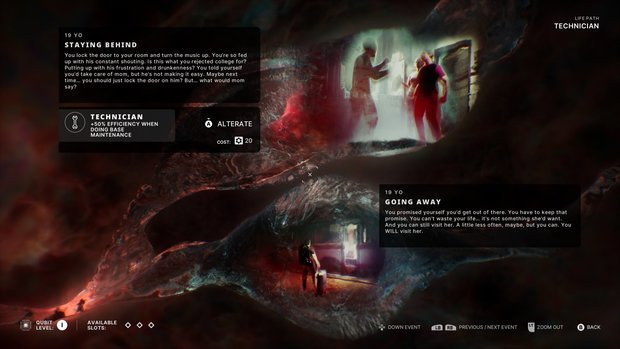
As the demands on your time increase and the station begins falling into disrepair, you’re going to need help, and that’s where the alters come in. Rapidium allows you to create new variations of yourself, based on detailed “mind records” that Ally Corp helped themselves to without your knowing consent. Alters are essentially adult clones, but with a twist. Each is born out of a significant choice Jan has made, complete with his own alternate lifeline from that point on. Where original college-aged Jan chose to leave his mother with his abusive, alcoholic father, what if he’d stayed and stood up to his father instead? Jan #1 did nothing to interfere as a young woman was being mugged, but what if he’d had the courage to help her instead? More than just moments in time, these incidents were defining catalysts that sent Jan’s life in one direction that could have been so much different – and were, in the form of the alters you create.
The story potential for this setup is abundant, and to a degree the game does explore themes like regret and self-determination, but the developers have made a few key decisions themselves that shifted the focus elsewhere. You’re able to examine the key points on Jan’s life path ahead of time, and so have an idea of the different man he’d become with different choices. However, because of the urgency of the situation, and the fact that each alter has conveniently developed his own entirely different area of expertise – scientist, doctor, botanist, miner, etc. – you’re encouraged to choose alters that will be most useful to the cause. (Your first alter, Technician Jan, is predetermined, but later you get to pick.) With a few exceptions, alters can interchangeably perform the same roles, but specialists will do so better and more efficiently, so it benefits you to strategize who might be best suited to your current needs, rather than which alternate lives you might otherwise rather explore.
Effectively answering the question of “nature vs. nurture,” Jan’s alters also have remarkably different personalities, preferences and temperaments. Even looks, as they each have their own individual styles, though they all share similar physical characteristics seemingly designed with Pedro Pascal in mind to play in a hypothetical movie adaptation. This too opens up a lot of narrative possibilities, as wildly divergent variations of Jan must learn to co-exist and cooperate through choice-based dialogue that gauges emotional responses of the alter you’re speaking to. And as you can imagine, some of them don’t take too kindly to being roused from unbeing and told they’re copies, their “memories” nothing but a manufactured sham.
Unfortunately, for those thinking this sounds something like the movie Moon, not only do the alters’ personalities tend to rely heavily on blatant stereotypes – grunt Jan is a good ol’ beer-drinking homeboy, science Jan predictably dweeby – but the differences are SO pronounced that the original conceit tends to get lost. With a station full of virtual strangers, they largely stop feeling like the same person at all. Granted, the alters do share some common history that helps forge (or fracture) relationships to an extent, but often it didn’t feel that much different from any other sci-fi adventure in which diverse crews must learn to get along.
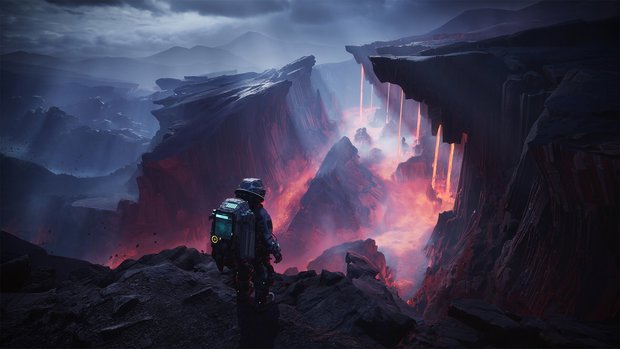
The alters do ultimately help maintain the station, making things feel more automated, but it continues to be your job to assign them roles and monitor their locations and status like any other resource. Each has their own limitations and attitudes that impact their effectiveness and even willingness to work, so you can’t just ignore them. It’s not enough to feed them all basic rations – at least, not if you want to keep them happy and motivated – and if you find enough cargo drops of personal items outside, you can furnish your Jans with their own communal rooms, movies and even a beer pong minigame. All perfectly natural under normal circumstances, but with time ticking down to a looming, scorching death, I rather resented any time one of them gave me any guff. Sure, it sucks to be a clone and stuck on an alien planet, but how about we put our big boy pants on, get the station to safety and THEN work through our hurt feelings?
You can’t ever wander too far away from your home base, but I enjoyed myself most whenever I ventured outside on my own in search of resources, exploring the beautiful labyrinthine wastelands of this hostile planet (ever aware of spending too much time dawdling). The scenery changes somewhat every time the station wheels its way majestically to a new location. But invariably it’ll need to stop, offering a new window of opportunity to get to work before the sun catches back up. The problem is that while the larger obstacles might differ, like broken equipment or an impassable river of lava, each stopover begins to feel relatively similar to the last. The gameplay cycle – explore, scan, build, and harvest resources, in between running (or, thankfully, fast-traveling once instant transport mechanisms are in place) back to base to put out any fires your alters have caused or can’t deal with themselves – soon becomes busywork, broken up only by occasional new challenges like harder rock that needs a special drill to get through.
Contributing to the feeling of repetition are the environments themselves. They’re all sharply designed, but you can expect some combination of grey, black or blue barren rocky terrain, punctuated only by the occasional burst of colour from gasses or other natural elements. I did say “hostile” earlier, though. The Alters never becomes an action game with traditional guns and enemies to shoot, but there are some increasingly frequent environmental bubble-like gaseous hazards that must be deftly maneuvered around or disabled to avoid absorbing dangerous radiation or losing valuable time, all while monitoring your suit’s depleting battery level. Those are a nice change of pace – the first few times.
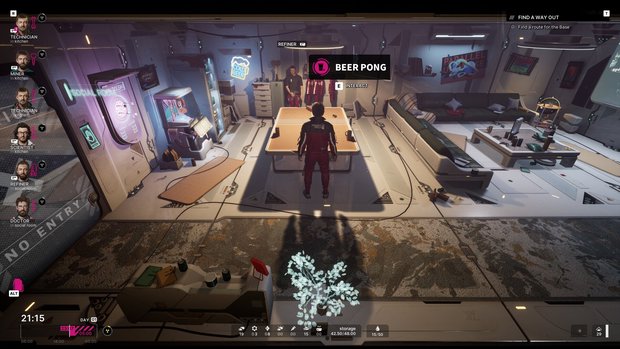
The rest of the design is wonderful as well, feeling very much like an AAA production, though doubtless the budget came in well under that. The graphics are crisp and clear, except during conversation where the models tend to be a little wispy, which I can only imagine was intentional and doesn’t interfere with the alters being suitably expressive. As befitting a game about clones, most of the voice acting is performed by one man, Alex Jordan, who does an admirable job of portraying any number of different Jans, sometimes with completely different accents. Otherwise sound is fairly sparse but effectively atmospheric, with music largely reserved for ambient, mood-setting background and sound effects not particularly pronounced outside of the planet’s stormy exterior. The only real obvious production shortcut is the cutscenes representing significant moments between the alters, displayed as a series of hand-drawn stills.
All in all, The Alters is certainly an interesting experiment, one that I’m glad I tried, if not overly motivated to return to (let alone replay to see all possible permutations), with over a dozen hours behind me and no sign yet of the end. For fans of base-building, management sims and survival games, I can easily imagine this to be a creative spin that personalizes the gameplay in a refreshing, thoughtful way. For adventure gamers coming from a background of stronger storytelling to begin with, however, it feels more like an overly cumbersome complication of an idea that would have been stronger on its own, or at least required less micromanagement to progress.
There are three difficulty levels for “action” and two for “economy,” which are welcome options for beginners. But it isn’t enough, because it’s not the difficulty that hinders this game from a narrative perspective so much as the constant demands on your time and attention. I have a hard time even keeping my desk organized, let alone a whole mining station on an alien planet filled with a bunch of malcontent doppelgangers, and I find the never-ending balancing act of managing resources and relationships with alters to be more stressful than fun.
So, I was wrong about how adventure-like The Alters might be. Whether or not it’s a great strategy game I’m really not qualified to judge – although I will say that it does little to help bridge the gap to genre newcomers, which seems like a missed opportunity. As is the central narrative element, which forsakes depth of character for breadth of characters during a time of crisis and suffers as a result. And so I find myself taking a page out of the game’s own book and imagining “what if?” What if time wasn’t so crucial that it precludes more in-depth character interactions and thoughtful reflection on philosophical principles this game raises but never fully explores? What if resource management could be fully (or at least significantly more) automated, allowing players to better focus on the game’s namesake?
Perhaps it’s a pipe dream, but in the same way that some survival horror games are given a story-only update after the fact, so too do I wish The Alters would get the same, or at least a more story-centric version. As it is, the different gameplay elements feel more like opposing tensions than complementary ones, frequently in conflict, depriving them both of their maximum effectiveness. But a more streamlined, less time-constricted iteration of The Alters that frees players to focus on the narrative consequences of creating cloned variations of oneself, all within the framework of a deadly environment and suspicious corporate overlords? Yes, please!


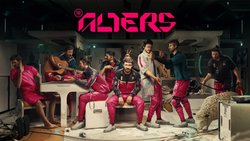


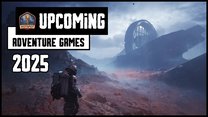
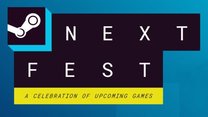
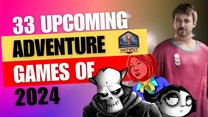
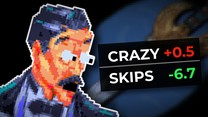

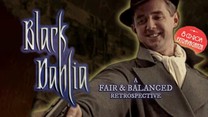
2 Comments
Want to join the discussion? Leave a comment as guest, sign in or register in our forums.
That's exactly why I didn't want to play The Alters. I had a feeling it wouldn't be very adventurey...
Reply
And you were right! To be clear, I expected it to be a full-on hybrid, not really an "adventure game," but I'd hoped it would be balanced more heavily on the narrative end.
Reply
Leave a comment